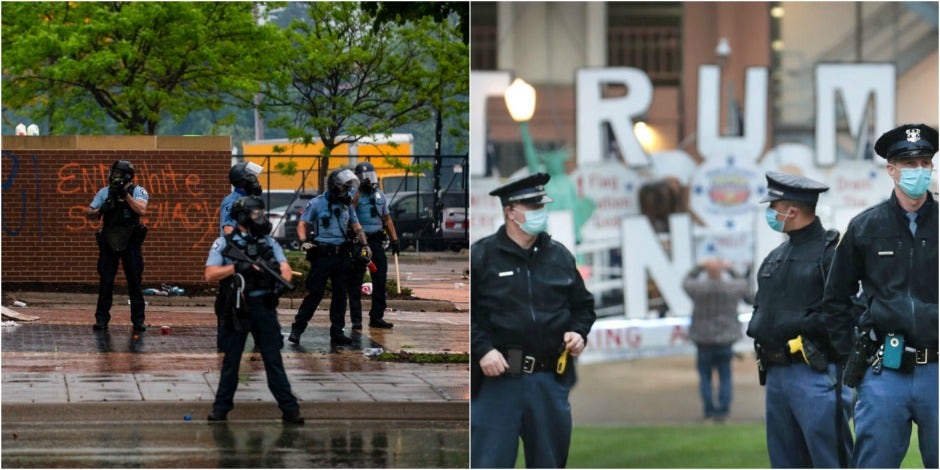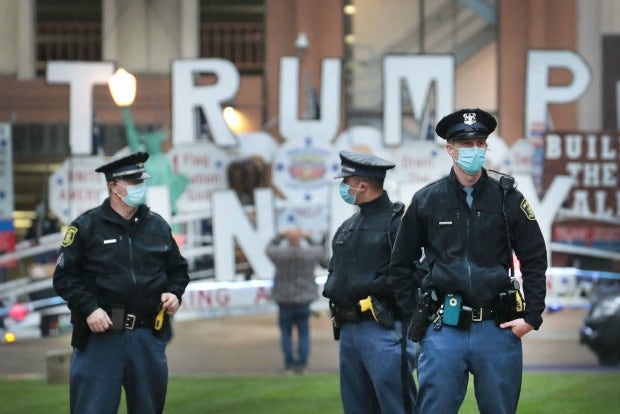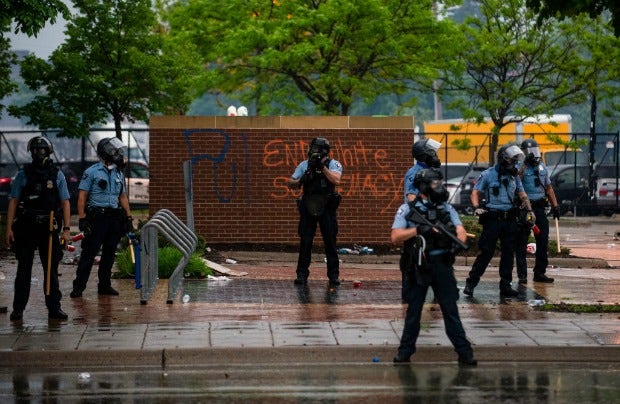What White Parents Must Teach Our Kids About George Floyd & Ongoing Racism In America
This is literally the least we can do for our black brothers and sisters.
 Getty
Getty Yesterday my social media and news outlets flooded with a series of videos.
One was of a white woman in Central Park, threatening to call the police to intimidate and potentially harm Christian Cooper, a black man, a bird watcher, who asked her to put her dog on a leash.
The other video was of George Floyd, 46, an unarmed black man in Minneapolis, dying while a white police officer knelt on his neck despite the three other police officers present, despite the onlookers begging him to stop.
"Please," Floyd can be heard pleading, "I can't breathe ... My stomach hurts. My neck hurts. Everything hurts ... (I need) water or something. Please. Please. I can't breathe, officer."
He appears to have died before ambulances arrived.
Black mothers and fathers in my social networks sharing the stories are asking, “How can I possibly keep my kids safe?”
White parents on my feeds are asking, “How should I talk to my kids about this?”
As a Jewish woman in America, I stand in the fringes of whiteness.
I am white, but my whiteness is conditional. Where there is racism, there is also antisemitism, and I am only safe, only accepted, within the privileges of skin color so long as I don’t make noise, so long as I don’t make a stink.
Only I am no good at silence.
It is for this reason the advice I have to offer is this: talk to your white children early about race and racism, and talk to them often.
In the photo below, state police stand guard as demonstrators hold a rally in front of the Michigan state capital building to protest the governor's stay-at-home order on May 14, 2020 in Lansing, Michigan. Scott Olson/Getty Images
Scott Olson/Getty Images
And in the photo below, police dressed in tactical gear attempt to disperse crowds gathered to protest the death of George Floyd outside the 3rd Precinct Police Station on May 26, 2020 in Minneapolis, Minnesota. Stephen Maturen/Getty Images
Stephen Maturen/Getty Images
Last week I finished reading the Addy American Girl books with my three daughters, between the ages of 7 and 10.
At the end of every American Girl book there are several pages of history lessons, context for the story. I have a tendency to riff while reading these.
Through the Addy books, stories of a black girl during the Civil War who fled slavery and went north, I told my children how much of this book wasn't the past.
When they cheered because the war ended and slavery was abolished, I told them it wasn't. I told them about prison labor and racism in prison sentencing and policing.
When the book talked about school segregation and how it ended in the Civil Rights era, I told them it didn't, and explained how redlining is responsible for how few black students there are in their school today.
When we read about racism in the north, I told them that racism didn't go anywhere. That here, at the northern edge of The Land of Lincoln, they will still see people flying a Confederate battle flag, because they believe they are better than black people, no matter what they say their reason is.
One of my kids cried. "Why are white people so awful?" she asked.
And I tried to tell her that not every white person is, but that all of us, even them, even so young, learn lessons from our society about what "good guys" and "bad guys" look like and sound like, and where they live, and that they are old enough and smart enough to look critically at themselves and the world.
I told them that whenever they see it, that seed from the stories they've been told, that foreign or brown or unfamiliar people are suspicious, are dangerous, are inherently worse than them, they have to dig it out.
They have to be willing to see racism in themselves and their world and fight it.
Tonight, when we talk about George Floyd and Christian Cooper — and Ahmaud Arbery and Trayvon Martin and Emmett Till — they will have the framework to understand what is happening.
They will understand that, despite what many white people say, equality never came to black Americans. They will understand that this new violence is part of a continuum of oppression that has gone on for hundreds of years.
These aren't easy conversations, but these are essential conversations.
I have three daughters who will grow up to be seen as white women in America, and they need to be allies to their black brothers and sisters.
They need to grow up knowing never to use the police as a tool of personal empowerment against black bodies.
They need to grow up with an understanding of their own whiteness, conditional though it may be, and the violence it has the power to inflict.
They need to know never to use their white-woman tears to threaten black bodies with murder for the crime of inconveniencing them.
It is literally the least I can do for my black brothers and sisters to teach this.
We should all be willing to do so little.
Lea Grover is a writer and speaker living on Chicago's south side whose work has been featured in numerous anthologies and on sites ranging from Cosmopolitan to AlterNet to Woman's Day. She speaks about sex positivity in parenting and as an advocate of sexual assault survivors on behalf of the Rape, Abuse & Incest National Network (RAINN) Speakers Bureau. Follow her on Facebook for more of her work.
